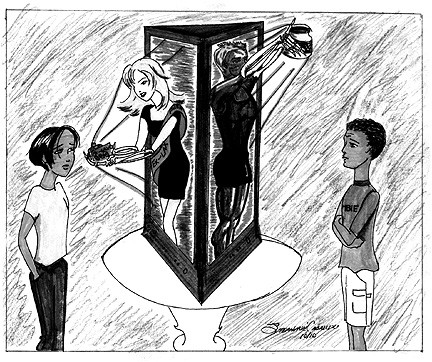
Anorexia.com
It has the highest death rate of any mental illness, killing nearly 1000 American women each year. In severe cases, it can also cause osteoporosis, loss of menstrual cycle, organ failure and sudden cardiac arrest. This devastating disorder is known as Anorexia Nervosa.
On an average college campus, about 90 percent of women have dieted. Throughout the United States, more than 10 million females suffer from eating disorders and 80 percent are unhappy with their appearance. Nearly 10 percent of “pathological dieters” eventually develop mature cases of anorexia, according to the National Eating Disorders Association.
As many researching psychologists and doctors look for aides in treatment, victims of anorexia are hard at work. In most incidences, these sufferers are striving for recovery; however, a growing population is putting their effort elsewhere.
The number of pro-anorexia Web sites is reaching immense proportions. The Eating Disorders Association estimates that more than 400 sites and chat rooms exist, many receiving at least 70,000 hits each year. Creators may also join a web-ring, allowing easy access to similar Internet pages.
Pro-ana sites offer detailed information and triggering pictures relating to anorexia. They serve to aid potential victims in their drive for thinness. Instead of offering supportive suggestions and resources, they serve as an instruction manual.
Classic pro-ana sites, such as The White Room, present personal stories, a list of “safe foods,” exercise tips, and photographs of emaciated models and movie stars. They also contain facts about eating disorders, links to related sites, and personal disclaimers.
A 15-year-old girl from Australia created The White Room. This site contains more than the typical information. “Winged Angel,” her preferred title, lists a current diet plan, daily food intake, recipes, and a personal contact link. This advanced site also suggests films, books, and song lyrics promoting excessively thin bodies.
As a result of their ability to compromise recovery, pro-ana sites alarm most professionals and parents of those suffering. Freely accessible to anyone via the Internet, these sites are completely anonymous. Here, visitors have the opportunity to express their issues and honest feelings without judgment.
“Specialists say people afflicted with anorexia and bulimia, often embarrassed and afraid of admitting they have a powerful mental disorder that could kill them, have turned to the anonymity of the Internet for support and acceptance among each other,” Dina Zeckhausen, an eating disorders expert, said.
One reference site, Support, Concern and Resources for Eating Disorders, also points out that the creators are proud of their beliefs. The hosts commonly portray their case as a “lifestyle choice,” not a disorder. The anorexia is their “friend,” providing comfort and security.
Though a large movement to ban pro-anorexia Web sites exists, many factors hinder its progress. Multiple watchdog groups recruit online members to help raise awareness of this problem, but they can do little more; persistence is the key to their survival.
The creators continue to successfully argue their First Amendment right to free speech, while doctors and concerned parents raise the issue of moral obligation and responsibility.
“It (pro-ana site) normalizes their behavior,” Zeckhausen said. “If you’re surrounded by and connecting with other people who are doing what you’re doing, you feel like – oh, maybe this isn’t so bad.”
Led by Yahoo’s 1998 decision, an increasing number of search engines are trying to filter out detectable pro-ana pages. In response, hosts have disguised their sites with obscure names and web addresses. At this time, choosing to avoid these sites is the only unyielding solution.
The discovery of someone using harmful information from pro-anorexia Web sites demands careful attention. The S.C.a.R.E.D. site offers these helpful suggestions for those concerned.
Self-education about eating disorders is essential before initially raising the issue. If a one-on-one conversation seems too overwhelming, consider writing a letter. Be honest with fears and feelings; however, never judge the one suffering. Avoid predictable actions such as forcing food, spying, and interrogation.
Instead, be available to listen, and know that recovery takes time. Don’t assume guilt or make lifestyle changes in response to the victim.
Common reactions include anger and denial, but time usually leads to acceptance. In severe cases, the person may not be in a position to make rational decisions regarding treatment; anorexia is a “mind-engulfing” disorder. Remember it is always better to be safe than sorry.








